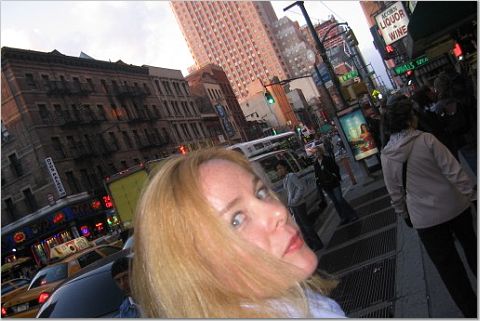 Better late than never. Jane Jacobs, who profoundly influenced urban planning not just in New York City, but throughout Western Civilization, will be honored Wed. at 5:00 pm (rain or shine) under the arch in Washington Square Park, the site of her first victory against the ravages of urban renewal that were being waged by the notorious Robert Moses. She died
Better late than never. Jane Jacobs, who profoundly influenced urban planning not just in New York City, but throughout Western Civilization, will be honored Wed. at 5:00 pm (rain or shine) under the arch in Washington Square Park, the site of her first victory against the ravages of urban renewal that were being waged by the notorious Robert Moses. She died It has become the contrarian fashion to say that Jane Jacobs' contribution to urban planning didn't address many of the problems we grapple with today, and that Robert Moses wasn't entirely destructive and wrong. I find this to be an intellectually lazy argument. No single person could simultaneously explode an entire profession AND anticipate every possible consequence of that (such as gentrification, which did not exist at the time that she wrote her seminal book, The Death and Life of Great American Cities, in 1961).
Still others have the impression that Jacobs was a milquetoast housewife who presaged New Urbanism by only favoring small, quaint neighborhoods -- which couldn't be further from the truth. What she was critiquing at the time -- brutal urban renewal practices -- compelled her to attack large-scale planning and modern architecture in favor of community and neighborhood, but that doesn't mean she dismissed everything big and modern as inhumane and unworkable. What makes Jacobs so compelling and enduring is the power and flexibility of her ideas, rooted in an instinctive response but articulated with precision and clarity.
As Paul Goldberger recently wrote in a Metropolis magazine piece entitled Jane-Washing, "Jacobs herself had little patience with much of what was presented as an extension of her views; she knew better and understood instinctively the difference between the real street life of an old New York neighborhood and the packaged synthetic urbanism of the new make-believe streetscapes." I can well imagine Jacobs might have been a big fan of, for instance, contemporary Dutch planning and architecture, which is both large-scale and ultra-modern.
What's more, to say that not everything Moses did was bad is to entirely miss the point. His unchecked power and dictatorial style coupled with a non-existent process for public input was the disease. The highways that crushed entire neighborhoods were the highly visible symptoms (parks and beaches being the positives externalities). Jacobs took on a dictator. We could use more of that kind of ballsy housewife nowadays.
On another note, people point to her long-running public feud with Lewis Mumford in order to degrade her ideas as those of an unsophisticated simpleton compared to the intellectually superior Mumford. No disrespect to one of New York's last great public intellectuals, but he could be a dyspeptic critic himself, launching attacks at everything including Rockefeller Center. "Architecturally, in short, Rockefeller Center is much ado about nothing," he wrote in the New Yorker in 1933, which he later reversed somewhat, leading one exasperated NYC official to complain to the magazine, "The problem with Mumford is, nobody can tell what he wants." With Jacobs, unlike Mumford, there was never any question about what she found lacking and what she thought worked. Mumford's thinking wasn't always so clearly-- and gracefully -- articulated, not to mention that he was more prone to urban utopianism than Jacobs ever was.
Scheduled speakers at Washington Square Park include New Yorker architecture critic Paul Goldberger, Ned Jacobs, Jane'’s son, and others. Since I am in full-on book-writing
Jacobs, Jane'’s son, and others. Since I am in full-on book-writing procrastination contemplation mode, I'll see you there.
UPDATE: Andrew Salzberg of Messy Diversity writes from Toronto to point out that, indeed, Jane Jacobs did like contemporary Dutch planning and architecture. In an interview with James Howard Kunstler (in Metropolis magazine), JHK asked her what parts of the world she likes and admires, and her immediate response was to say The Netherlands. "...The human scale of the whole thing and the density is far above what we are used to in North America, or anywhere. The high density and human scale are not incompatible at all."
The Netherlands is, of course, highly regulated and planned, contrary to the assumption that Jacobs only liked "organic" neighborhoods. Andrew goes on to point out that an op-ed piece in the Wall Street Journal recently praised Jacobs, practically labeling her a libertarian, because she didn't like planning. Again, totally false. She didn't like top-down, FASCIST planning that left no room for public participation and resulted in the destruction of neighborhoods. Thanks, Andrew.
